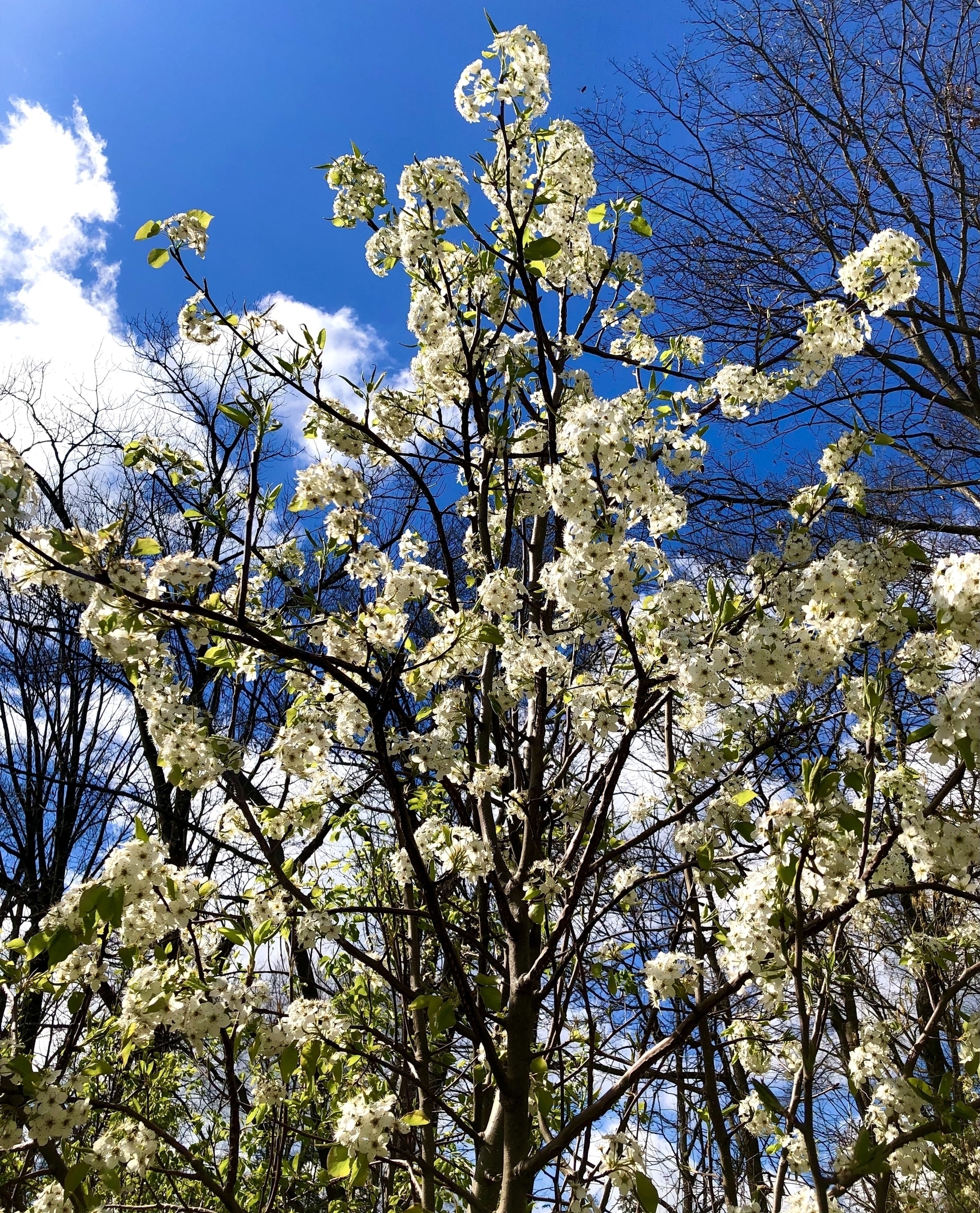22 April 2022
Istiqlál, 14 Jalál (Glory), 179 B.E
Seen
Bradford (Callery) pear (Pyrus calleryana) in full bloom.

This is another beautiful ornamental tree, native to Asia, and popular in urban landscaping in the US several decades ago, that is now branded as an “invasive species” in many areas!
Done
I’ve started writing about what I consider to be the three primary organizing principles which govern human social systems: unity; love; and, justice. Translated into more secular terminology they become statements: we are interrelated; we are interconnected; and we are interdependent. In the social system vernacular, we belong to the same human family—no matter how unique each of us is; we exist as nodes within the same social network and remain associated one to the other irrespective of difference and distance among us; and what any one of us thinks, says, or does affects everyone else—in other words, each person matters.
Because we matter, we are each responsible for our own behavior and held accountable by the larger system (physical and spiritual!) for our choices. Just as we don’t know what choices were made by whom and when that are framing the choices in front of us now, we can’t possibly know how our decisions made in the moment will affect everyone in the system in both the current and subsequent generations. It’s a bit overwhelming!
That’s the reason we have “rules”—many of them set down for us by those we trust as our spirituals guides, religious prophets, and founders of world belief systems. Even then, try as we might, we have a difficult time following the rules so we get into trouble. In fact, we’re told that with the exception of a rare few, no one can behave in perfect accordance with the rules.
Our only recourse is to take responsibility for our choices and ask for forgiveness when the tack one chooses runs afoul—as it inevitably will. And as interrelated, interconnected, and interdependent passengers on the planet, our “forgiveness challenge” is twofold: to ask for forgiveness AND to forgive others. Too many of us are not so accomplished at doing either one!
Because forgiveness and responsibility are two sides to the justice / interdependence coin, realizing that we’re all connected isn’t enough. We have to believe we make a difference—that we matter to others—and as such we CARE about others because we’re members of ONE HUMAN RACE bound by LOVE to one another.
Yes, the climate crisis affects everyone—so do pandemics, global conflicts, and forced migration by millions. But if we don’t truly believe we are ONE global family whose members are tied together by our LOVE for each other, and thereby take individual RESPONSIBILITY to exercise CARE about our fellow family members to assure their welfare, we’ll never have the collective capacity to respond to the gauntlet this world throws in front of us.
In terms of social change or social transformation, an effective strategy is to elevate the spiritual awareness and sensitivity of individuals such that they directly demonstrate love, care, forgiveness, responsibility-taking, etc. within their circles of family, friends, and community members. Over time this ripples out to wider circles and eventually influences the leaders of governments, corporations, and institutions to change course—and a revolution by spiritual means advances!
Noted
Astral Prospecting on Instagram and Astral Prospecting on Facebook
Astral Prospecting’s 2022 fishing season is off to a fine start with this “smallie” — smallmouth bass (Micropterus dolomieu)

Marc Bosserman on Instagram Marc Bosserman on Facebook, and Marc Bosserman Music and Musings on YouTube
Quoted
Since we addressed our 30 December 2021 message to the Counsellors’ Conference, National Spiritual Assemblies and Regional Bahá’í Councils have been earnestly assessing the possibilities for intensifying the process of growth in the clusters within their jurisdiction during the Nine Year Plan. We feel it would be helpful, for the purpose of gauging the progress made over time, to view the Plan as unfolding in two phases of four and five years’ duration, and National Assemblies were invited to consider the advances they expect to see in their respective communities by Riḍván 2026 and then by Riḍván 2031. This exercise also involved a re-evaluation of cluster boundaries, and the outcome of these adjustments is that the total number of clusters in the world has risen by a quarter and now stands at over 22,000. Judging by the forecasts received, it is estimated that, by the end of the Plan, a programme of growth at some level of development will exist in around 14,000 of these clusters. From among them, the number where the programme of growth could be considered intensive is projected to climb to 11,000 over the same time period. And of these, it is anticipated that the number of clusters where the third milestone has been passed will rise above 5,000 by 2031. Without question, to make such advances will entail colossal effort over the entire duration of the Plan. Yet we find these to be worthy aspirations towards which to strive, for they represent an ambitious but serious appraisal of what lies within reach. 1
- Universal House of Justice. “Riḍván 2022 – To the Bahá’ís of the World.” Bahá’í Reference Library, April 20, 2022. https://www.bahai.org/library/authoritative-texts/the-universal-house-of-justice/messages/20220421_001/1#987507526. [return]